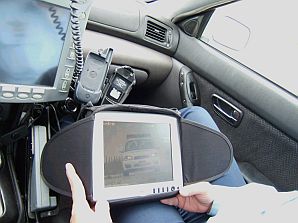"Have you been followed at all during the last few days? Any suspicious phone calls? Any kind of surveillance at all? Anything?"

Beware! Big Brother is watching
I came across this article in todays J-post about a new way to enforce traffic laws
Here is the article in full:
Drivers tempted to ignore a no-entry sign or cross a continuous white line in order to overtake another vehicle when the police don't seem to be around may need to be more cautious in the future.
This is because the police are considering deploying a system of unmanned aerial vehicles (UAV) that allows them to spot traffic violations from the air and fine or prosecute offenders.
The system has already been tested in the north of the country, and on Monday southern police carried out their first trial under blue skies and unremitting sunshine just outside Lehavim, north of Beersheba. The UAV, which is equipped with a camera, flew at a height of 6,000 feet and was impossible to see or hear despite the fine weather.
So when police stopped a number of offenders, their first reaction was to deny they had committed any traffic violations and to wonder how they had been seen.
Ch.-Supt. Ze'ev Guttman, the commander of the southern traffic police, explained that a policeman in a command center controls the UAV and its camera and informs the policemen on the ground of any violations.
"It gives us the opportunity to operate another, hidden dimension of enforcement," he said.
The patrolmen also have a screen with them, and there are systems that allow them to control the UAV and its camera from their car, and to replay video footage.
"The driver sometimes asks how he was spotted and the policeman can show him," said Guttman.
When asked if the police were becoming like Big Brother, he said, "No, we are just enforcing the law."
Elad Menashe of Yavne-based Aeronautics Defense Systems, which developed the system, said, "You photographed him. You can see him the whole way, show him where he carried out the violation, and then he has nothing to say."
The offenders who were stopped were let off with a warning, as the police were only testing the equipment and cannot use the pictures as evidence in court, said Guttman. Nevertheless, he was satisfied with the morning's work.
"We see that there is potential," he said. "Here we have seen that it does serve our purposes."
Menashe said the system, which has night vision, can also track stolen vehicles and provide traffic reports.
"A helicopter costs a lot of money. Its time in the air is limited because its fuel is limited. The UAV can be in the air for 12 hours and some can be in the air twice as long," he said.
The product has attracted interest from law-enforcement agencies in Europe and Africa, and the company also sells its products to militaries around the world, including the IDF, said Menashe.
However, the UAV's camera doesn't measure speed, although it can measure the time it takes for a car to travel a particular distance and provide its average speed, said Menashe.
It would add to the use of speed cameras, which could cut the high number of road deaths in the US if deployed extensively, a new report shows. The study, which was published in the American Journal of Preventive Medicine, also recommended reducing speed limits, the Hebrew University of Jerusalem said Monday.
The research was headed by the university's Prof. Elihu Richter and was carried out by teams from Hadassah and the University of Illinois School of Public Health.
Speed cameras are barely used in the US, where death tolls rose 15 percent on interstate highways following small increases in speed limits in the 1990s, the report said. This resulted in 450 to 500 more deaths each year. In Israel, road deaths increased 15% after speed limits were raised from 90 to 100 kph on three interurban highways in 1993.
However, in the UK, the installation of speed cameras, traffic circles and other measures in the 1990s helped reduce road deaths by a third. There was a similar phenomenon in Sweden, Denmark and Australia.
Had the US implemented the speed control policies of the UK during the 1990s, there would have been 16%-25% fewer deaths on the roads, the researchers said.
I personally have no problem with using this new technology to enforce traffic laws, but my one issue is this: According to what I was taught in the Academy, a police officer can only give a ticket if he himself see's the law being broken. It isn't good enough for your partner to tell you he saw something because if you are called to court to testify, you may only say what you saw with your own eyes, not your partners.
In this article it claims
"a policeman in a command center controls the UAV and its camera and informs the policemen on the ground of any violations."
The policeman writing the ticket hasn't seen the infraction and therefore shouldn't be allowed to write the ticket.
J.
------------------------------------------------
The possibility that we may fail in the struggle ought not to deter us from the support of a cause we believe to be just.
– Abraham Lincoln


5 Comments:
I've been beeping whenever I walk the past few days. Rather discerning. The faster I walk, the quicker the beeps. I stop, the beeping stops.
It sounds creepy - but if it saves lives it is worth it. Too many people die in this country because of traffic accidents - and most of the problem is the crazy way people drive. It is worse than NYC.
If I remember correctly, Israel has the most traffic deaths per capita besides Portugal.
I agree with the idea, I just dont like the fact that it seems to contradict the law.
J.
Sounds a little big brotherish to me.
jack: even if it's meant to save lives?
J.
Post a Comment
<< Home